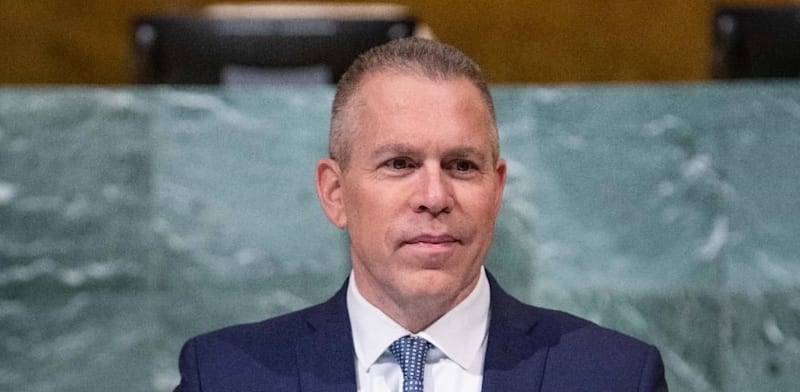ARTICLE AD BOX
Mickey Raviv told the Globes Infrastructure for the Future Conference that Israel Railways should worry more about quality in awarding tenders.
"We beat the Chinese in competing for the tender in Jerusalem, and we proved that it can be done without politics," Spanish public transport systems manufacturer CAF Israel president Mickey Raviv told Globes Deputy Editor Dror Marmor at the Globes Infrastructure for the Future Conference. Talking about international aspects of infrastructure investment, he expressed cautious optimism about the possibility of building major transportation projects in the country.
When asked about the possibility of connecting Israel's transport system to Saudi Arabia, Raviv said, "We are in an era of incredible transformations. No one expected that during President Trump's previous term, Israel's 25-year-old relations with the Persian Gulf would 'come out into the open.' I hope that the plan (for normalization) with Saudi Arabia will get underway now. What is needed is 200 kilometers to connect the Saudi railway network to the Israeli one - via Jordan."
As the representative of an international company are you also looking at this horizon?
"Absolutely. For us this is easy. CAF is very active in Saudi Arabia. Most of the Saudi railway fleet is CAF's. I know the planning and deployment of trains there, it is very easy to implement and it shouldn't be underestimated."
Today, the Israeli railway market includes European rivals from France, Germany and Spain. After a difficult 18 months, are your Spanish bosses still here?
"Yes, of course. Since I founded CAF Israel in 2020, there has never been a moment when there was no foreign workers in the country. We are talking about the Covid period, the days of the Gaza operation in 2021, and now during the war. There has never been a situation where there were no foreign workers here. After the war broke out, we evacuated the women and children (10% of CAF Israel employees are foreigners). After the women and families returned to Spain to enroll their children in schools, the foreign workers returned here."
Since the war broke out, CAF's global CEO has visited Israel twice. CAF's franchise project manager has visited here 10 times. The company is alive and kicking, and recognizes the importance of the Israeli market. It is a small country but a huge market for us."
How did you prepare for situations like the war? Were you affected by political pressures?
"We have long experience operating on the route between Europe and Israel. One of the first things we did was prepare a contingency plan that gave the headquarters and the foreign workers certainty in case something happened in Israel. How do you take care of their safety and security? In terms of political pressures, I brought in a recognized independent international ESG (Environmental, Social and Governance) expert. He visited our projects, in the Arab neighborhoods that border the line (in Jerusalem) near the Kalandia crossing. He consulted with the local populations and understood that these types of projects are essential for the population no matter what politics says."
RELATED ARTICLES
Was there a discussion about security? Was it political? Was competition affected?
"I don't think competition was affected. A different group (of companies) is selected for each project. Israel is identified as a target, perhaps geographically small, but because of its backlog of projects it is very attractive."
How afraid are you of Chinese competition?
"We beat the Chinese in the tender for the project in Jerusalem. In other urban projects, PPP projects (government concession to operate by a concessionaire), we also proved in Jerusalem that it is possible to defeat the Chinese participant regardless of politics, even on the matter of pricing."
What expectations are there for upcoming projects?
"Whether it's the Tel Aviv Metro project or the one in Jerusalem, whether it's Israel Railways commuter trains. In every railway project in Israel, CAF will be there. In recent years, there have been mergers between manufacturers in the railway world (such as between Alstrom and Bombardier). We see consolidation that hurts competition. It's important for us to recognize the importance of this market and to be here. We'll be here for every tender that will be published."
Is there a shortage of engineers? Those who graduate in engineering prefer to work for a chip manufacturer like Nvidia. "We see this. Engineers mainly prefer the low-voltage electricity sector today, meaning they go to work in the chip industry. We're looking for people who came from other industries, train them and introduce them to our industry. When I first arrived at the international railway exhibition (InnoTrans), which meets every two years in Berlin, there were five Israelis. At the last conference, there were already 500 Israelis. This shows how the projects that the market here offers are attracting more industries to enter the railways."
Raviv shares a story about how his activities helped a local manufacturer from the north. "On one of my trips to the north, I saw a vehicle with handrails manufactured by a company called Tal and Hadas. We searched and found a company located in an industrial area in the north of the country. We drove up to them and told them that we wanted them to produce all the handrails for the trains in the country. They internalized the standards, and then Tal and Hadas from the north produced a lot of internal components for the trains of Bombardier and then for CAF. If there is a possibility of taking on projects for the success of small and medium-sized businesses in the country, we made a difference."
Are there enough companies like Tal and Hadas and CAF here for the Metro project and the railway to Eilat?
"It's feasible. But let's put matters in order. In the Israel Railways intercity network, it's important that there be an opportunity for international suppliers to enter there. Israel Railways relies on two international suppliers, there is room for additional players. It's important that in Israel Railways tenders, on matters of quality and price, more serious emphasis is placed on quality. We don't want to get stuck here with aging trains that don't do the job even in thirty years."
"It's important that there be a government company that will build metropolitan trains. Knowledge has accumulated in Israel, but not in one place. In NTA, knowledge has accumulated about executing a project, while in Jerusalem, knowledge has accumulated about tenders. What's needed is to unify the business. Jerusalem's insights into tenders should be integrated with NTA's insights into execution."
Are there financing capabilities for future projects?
"There's enough money. We closed financing on time (in our projects). Today, there is no problem financing projects in Israel."
Full disclosure: The conference was sponsored by Ackerstein, CAF, Israel Railways, Netivei Israel, and Egged and with the participation of Ashdod Port and Mekorot.
Published by Globes, Israel business news - en.globes.co.il - on February 3, 2025.
© Copyright of Globes Publisher Itonut (1983) Ltd., 2025.

 1 month ago
52
1 month ago
52







 English (US) ·
English (US) ·